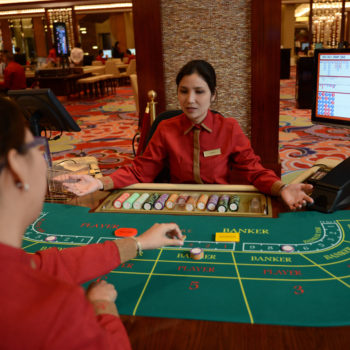ESPN, the sports TV network recently launched a sports podcast called “30 for 30.” It’s based on their celebrated documentary series of the same name. The first season is five episodes, each dedicated to a different sports story.
Brendan sat down with editor Jody Avirgan and producer Rose Eveleth to talk about their upcoming episode called “Queen of Sorts,” which will be released on July 18. It’s about gambling. Brendan kicked things off by asking, “Is playing cards really a sport?”

Jody Avirgan: We’re already sort of like nudging at the definition of what sports is in our first season, but–
Brendan Francis Newnam: OK. ‘Cause I thought physical exertion was an element of sports, but…
Rose Eveleth: They played for 30 hours non-stop one time.
Jody Avirgan: This is a gambling poker story we are calling it sports.
Rose Eveleth: Yeah. For sure.
Brendan Francis Newnam: But actually, beyond the being a sports story this is a revenge story about a card shark or an advantage player, as they’re known, and her name is Kelly Sun. Can you tell me about her?
Rose Eveleth: Yeah. So, Kelly Sun grew up in China. Her family was really rich and then the cultural revolution happened. Her family lost all their money. She grew up really poor and then when that ended her dad made a lot of money again and she sort of benefited from that by getting really interested in cards.
And so, she would go to Macau and play and she eventually made her way to Vegas to play. Except that at the time, when she first started, she really had no idea what she was doing. She was kind of like me if I walk into a casino with a lot of money, I will definitely lose all of it.
And she did lose all of it. And in fact, she wound up in debt to MGM and eventually wound up in jail for debt to MGM. And so, when she got out of jail, she decided she was going to get her revenge on them. And she learned how to do this very difficult thing called edge sorting and basically used that skill later to make millions and millions and millions of dollars.
Brendan Francis Newnam: Kelly Sun is known in the business as what’s called an advantage player.
Rose Eveleth: An advantage player is anybody who turns the advantage to themselves against the house. That can be card counting, which is probably the most famous version of that. So if you’ve seen the movie “21,” they’re card counters. But there are people who do things like they figure out when a slot machine is supposed to cash out because it’s on a timer and they just sit there and put in pennies and get the cash out. This is an advantage play. Anything that you do that basically turns the odds in your favor is basically considered an advantage play.
Brendan Francis Newnam: So, your episode centers primarily around one big play as it’s called. Which I always want to call it a “job.” Like if you’re watching a crime movie or a caper it’s the “job.”
Jody Avirgan: We kind of weren’t sure whether to call it. A play, a con — which is a fraught word — a job, a caper. Basically, they did this at a bunch of different casinos, her and her partner Phil Ivy. But we kind of centered around one at Crockford.
Brendan Francis Newnam: So they walk into Crockfords, which I picture as some classy British casino out of a movie. I picture suits and their private room.
Rose Eveleth: Yeah, their logo is a guy in a top hat and tails and there’s like, all the paintings on the walls are like people on horseback. It’s very classy.
Brendan Francis Newnam: OK, and so she goes in with her partner and what goes down?
Rose Eveleth: So, basically, for this play to work and the thing that’s kind of wild about it even working in the first place is that they have to ask for a whole bunch of things. They have to make a lot of requests and the casino has to change the way that they normally play the game in order for this to work.
So they ask for a special game, they ask for a special dealer who speaks Cantonese so Kelly can talk to her so that the pit bosses in the room can’t understand. And then, basically, what she asks the dealer to do is turn the cards in certain ways so that the valuable cards in the game they’re playing, which is Baccarat, go one way and the not valuable cards go the other way. So, yeah, it’s confusing.
Brendan Francis Newnam: I would like to pause you right there. When I go to a casino I get a free drink and that’s nice, but how are they able to tell? How are they able to pick their dealer and?
Rose Eveleth: Well, if you wire $3 million, you get whatever you want.
Jody Avirgan: And this is where I think this story goes beyond just being a really interesting caper and teaches us something about the world of high stakes gambling. Which is when you are going in with this much money and someone like Phil Ivey in tow–
Brendan Francis Newnam: Which was her partner and a very famous poker player.
Rose Eveleth: Very famous guy, yeah.
Jody Avirgan: You get to ask for and things are given to you than no just no other person would get.
Brendan Francis Newnam: So they were asking the dealers to turn the cards, but they also asked to continue to use the same deck, which seems to be the key in edge sorting. Talk about why that would matter.
Rose Eveleth: Right. So they need a certain kind of card that is cut in such a way that it’s not symmetrical.
In the video above, Rose explains “edge sorting.”
Jody Avirgan: We struggled a lot with this.
Rose Eveleth: [While holding up a card.] So here’s the card. Look at this edge and that edge.
Brendan Francis Newnam: Yeah. OK, basically when they’re making cards, there’s diamonds on the back of them. And when they cut the cards, some of the cuts on the diamonds are imperfect. They’re different, right? One side, on this right side of this card I’m looking at you can see the entire diamond on the left side they’ve cut the diamond in half.
Rose Eveleth: So Kelly can see when those are slightly different, and it is an incredible skill that she has. She showed it to me and I was like, “I can’t really… I don’t understand this.” But she’s spent thousands of hours training herself to see this.
When they get the dealer to turn the cards so some of them go one way and some of them go the other way, they do that as basically sorting those cards into two groups. The valuable cards are one and the non-valuable cards are the other. They need to reuse those cards because then when they come back out she can see that little edge a-symmetry and she can tell you if that’s a valuable card or a non-valuable card. Which basically means, all told, they have about a six percent edge on the house. Which is very, very large.
Brendan Francis Newnam: Because the house traditionally has a one percent edge over the player. They end up being able to rake in lots and lots of money. So they pull this off and they make $10 million. Or?
Rose Eveleth: So they win 12 million at Crockford, they’ve won over $10 million other places, in Atlantic City, in Australia, they’ve won a lot of places. Crockfords, however, figures out what they’re doing and decides they do not want to pay them.
Brendan Francis Newnam: Yeah, so they leave with a receipt to get the money wired to them and then they’re like, “We’re not wiring you because…”
Jody Avirgan: Yeah, it’s not like in the movies where you get to go and give them like 50 black chips and they give you a suitcase.
Brendan Francis Newnam: So, we’re focusing on tactics, but the other thing at lay here is Kelly is widely considered one of the most dangerous card players in the world. And part of that is her ability to do this edge sorting, she’s been doing the game a long time. But of her strengths is the ability to manipulate peoples perceptions of her.
Rose Eveleth: This is one of those stories where when you tell people the whole thing they’re like, “Well, how did they possible get away with this? And part of it is that casinos have this idea that Asians and particularly Asian women are stupid and are sucker gamblers. And so when she walks in and she plays that up, they already think that Kelly’s dumb, but then she plays into that quite nicely.
Brendan Francis Newnam: So part of it is that they underestimate Kelly, and as we’ve said before, the dealer does everything she asks. At no point does she touch the cards. So is this cheating? What do we say “30 for 30” editorial team?
Rose Eveleth: What do I think?
Jody Avirgan: Yeah, I’ve been trying to get Rose’s opinion on this for a while.
Rose Eveleth: Oh, I know. I’m so stoic. I think it’s really interesting because I have oscillated between both sides. On the one hand like you said, they didn’t touch the cards. They didn’t mark the cards. The casino could have said no at any given time. The casino knows that these cards can be used in this way. Edge sorting is not new. This is really the first time people have done it in Baccarat, but it’s been done in Black Jack, it’s been done other places. So the casinos could get cards that aren’t printed incorrectly.
So it seems like on the one hand the casinos, if you’re gonna be sloppy, you kind of gotta take the knock, right? On the other hand, there’s kind of this element of she was talking to the dealer in a language that none of the surveillance people could understand. She and Phil knew something they didn’t. I tend to come down on the side this isn’t cheating. If you are dumb enough to change your procedures this much, I mean, it’s kind of your own fault.
Jody Avirgan: I think the most compelling argument I’ve heard is that the house always has an edge in any game. They are playing an advantage game. When you walk into a casino against anyone in any game, they would not set up a game if they didn’t have an advantage.
And now the instant that someone does the work to tilt that advantage in the other direction, they throw their hands up and claim that its cheating. And I just don’t find that compelling.


